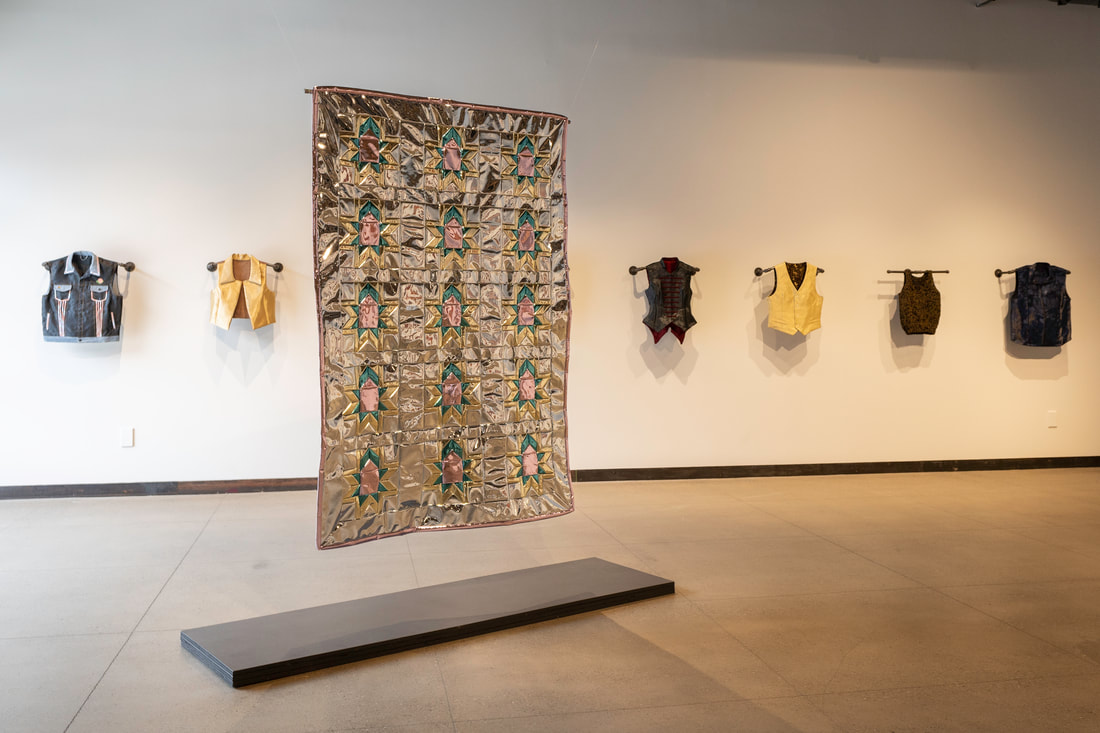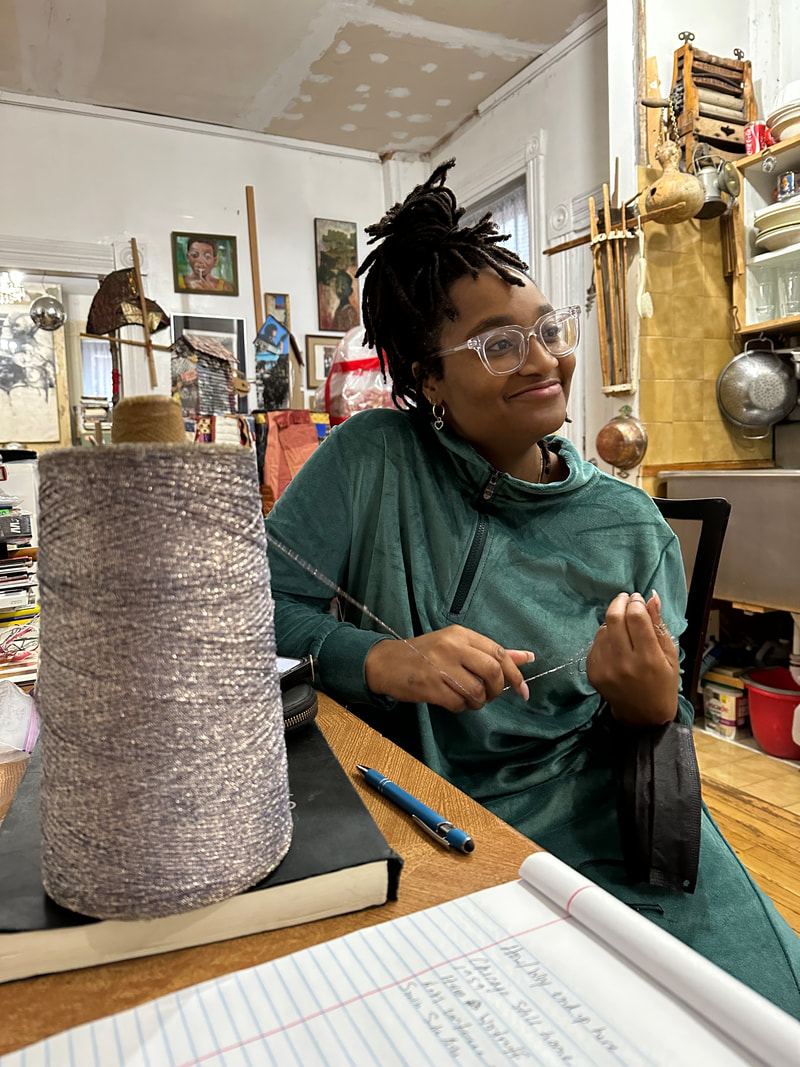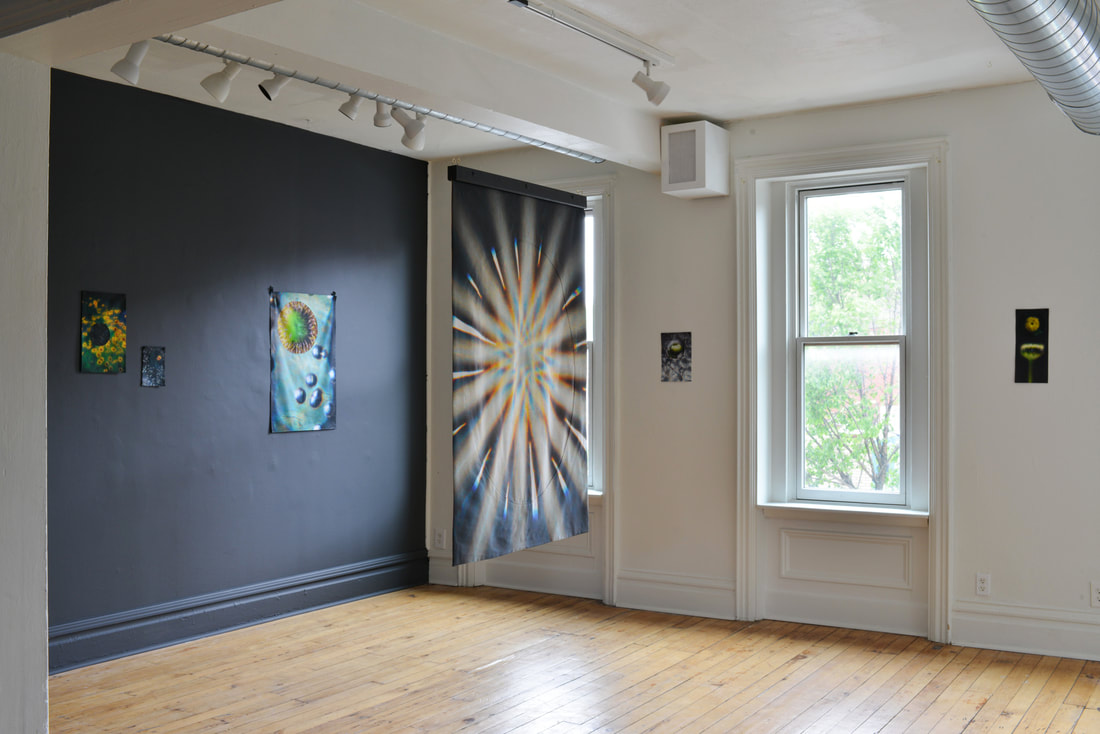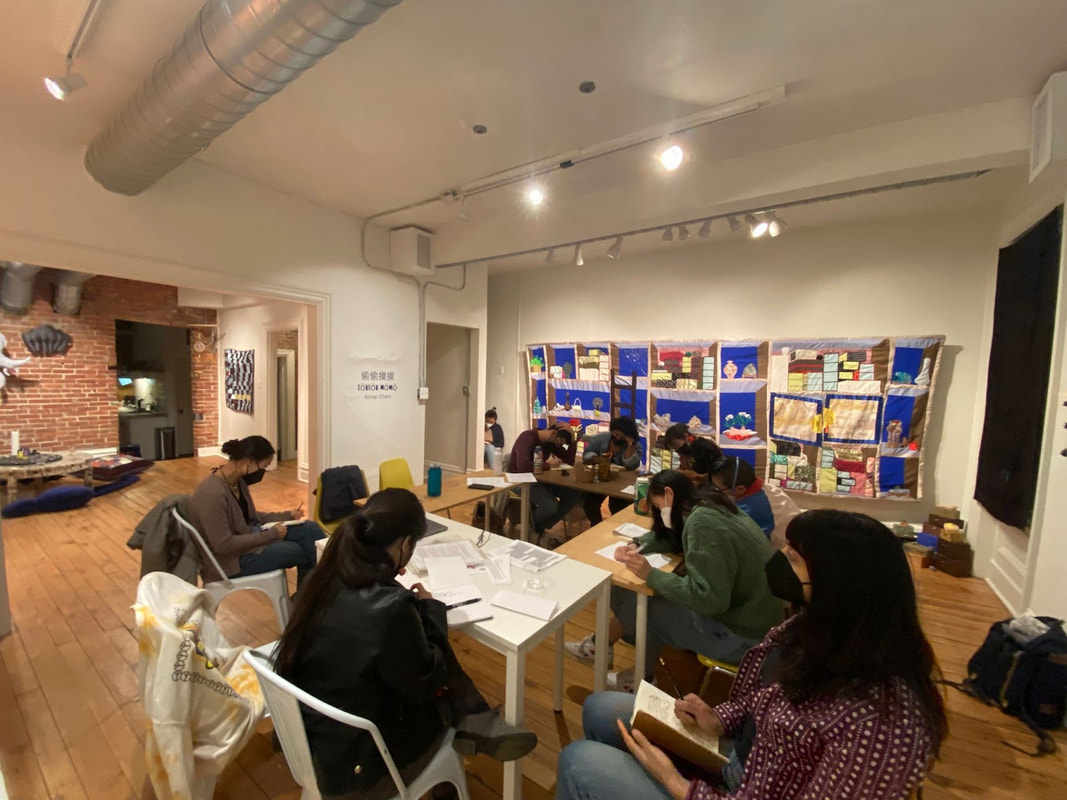
The Unexpected Reader workshop in progress at Bunker Projects
4/13/23The views and opinions expressed in this article are solely those of the author. They do not reflect the opinions or views of Bunker Projects or its members. Images courtesy of Elina Zhang and Bunker Projects.
On March 12th, Bunker Projects generously donated their space for an Asian American Pacific Islander (AAPI) writing workshop, called the Unexpected Reader, organized by the JADED Collective. The “Unexpected Reader” is a term coined by Elaine Castillo, which she defines as the reader who “is not remotely imagined — maybe not even imaginable,” by readers and publishers. In the second class, we focused on translation — translation across language, translation across form. During the workshop, we had the pleasure of engaging with Anne Chen’s show, 偷偷摸摸 tōutōu mōmō. During the workshop, we looked at different pieces and explored questions such as: How shallow is this? How deep is this? Where are there junctures of pain? Where is beauty concentrated? How viscous is the work? How long would it take to walk through? These are the works that emerged.—Elina Zhang
“Untitled”
Anne told me that she wants her work to be comfortable, but I feel like it’s also trying to kill me. Maybe it can’t decide whether it wants to be homey or to be dangerous. Or maybe it’s both. Or that the desires for both come from the same place.
Nothing is solid. Everything can be squished.
One of my favorite things about the show is the vinyl restraints holding up the two axes. There’s something uncompromising in her refusal to separate aesthetic categories, whether it is fairy bondage or low-fi LARP gear or teenage basement witch. It’s not about curation—whether things “go together” or not. But rather, maybe, a refusal to allow things to be categorized as belonging or not belonging. Not transgressing a duality, but refusing to acknowledge that it even exists.–Brent Nakamoto

Anne Chen, Books and Things (2023)
“Past and Presents”
In the lower left-hand corner of Anne Chen’s quilt—a probably 20-foot-wide piece partitioned into little cubbies, each with an assortment of cloth knickknacks and embroidered doodads—is a mound of rectangular prisms (books, shoeboxes, filing cabinets) wrapped in ornate fabric, tiny little gift boxes. Seeing them, I am taken back to my dada and dadi’s house in India, a house I visited for three days a year until I was fourteen.
I did not really know my dada and dadi, did not really know my cousins, did not know the language, did not know what to do with myself except sit in my father’s air-conditioned childhood bedroom. After finishing all the books I had brought, I would lie on the floor, my eye invariably caught by the little rectangular packages under the bed. Each are a few inches tall, a few more inches wide, a few more inches long, all wrapped in the same pink gift wrap. I had not thought about these gift boxes in years—not until I saw Anne’s quilt—and I wonder what it is about art that unlocks these so-very-specific memories.
I stared at these packages for years, until one day, something inside me broke—for no reason, I suspect, other than the erosion wrought by time. I took care to open it gently, to just peel back the corner, not the way I opened presents at Christmas. I just wanted a little peek, one tiny glance under the intricate pink wrapping. Inside, all I found was a rust-colored brick.
Just a regular brick, nothing special, possibly the worst present for a twelve-year-old to receive. I was so confused, so unsure of why this would be there, why everything in this place so far from home was so incomprehensible yet so alluring, and I wrapped it up as best I could and left it under the bed, never asking anyone about it, another part of my family history I would never understand. —Sahil Luthra
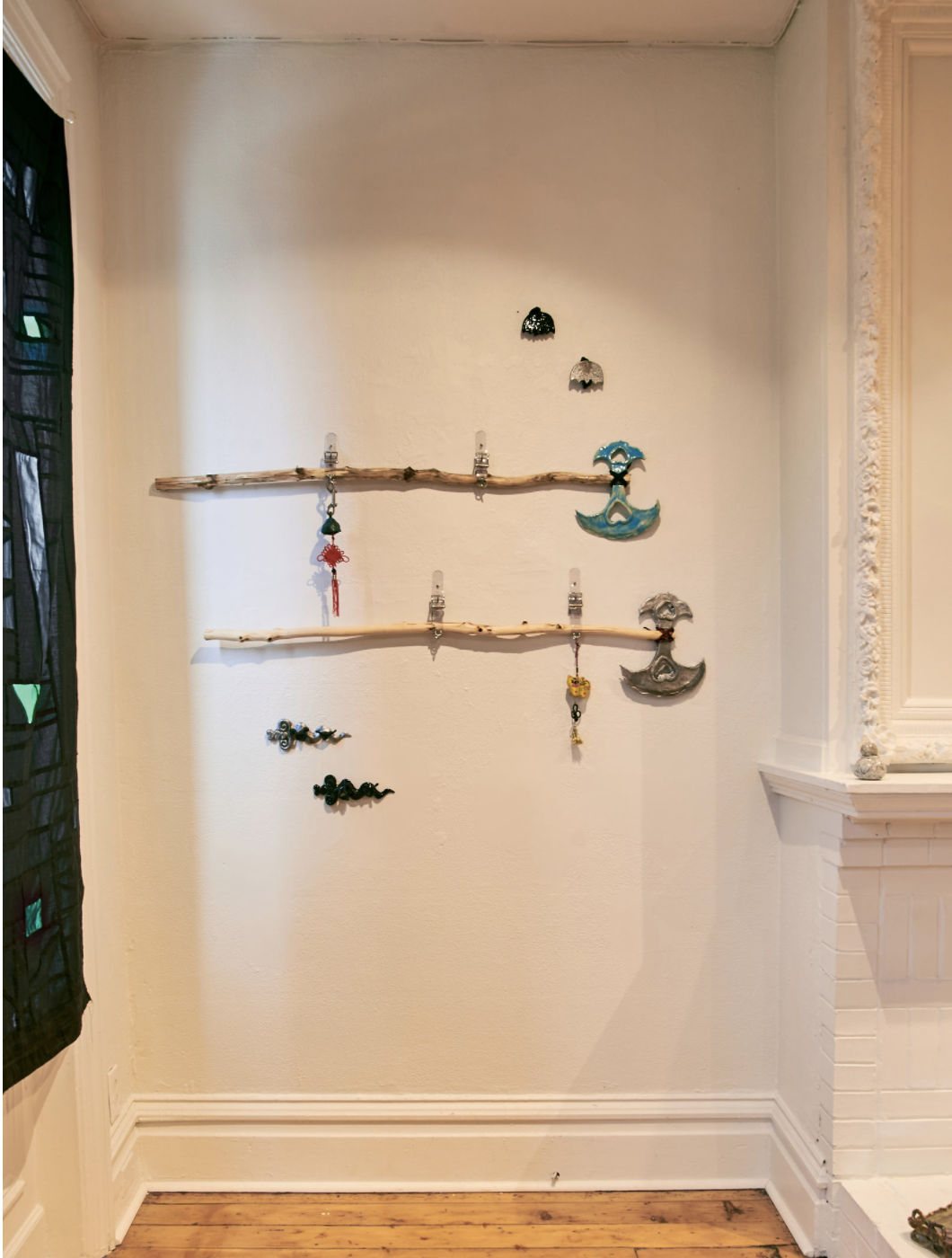
Installation view of Fantasy Blade X2 (2023)
“What We Keep”
Boxes crammed in a square cubby. Relatable in its urge to fit in as much as possible. Evidence that space is inhabited. We accumulate a reflection of ourselves. Perhaps “crammed” is the wrong word because there is an immense order and balance to these boxes. They are Jenga blocks adorned with shiny silk and intricate embroideries. They evoke care and quality. They have been left to sit on this shelf, collecting dust. Years from now, the silk will lose its sheen. But there is beauty that comes when you leave something alone to age, to grow, to be. To forget and then to remember all over again.
My curiosity is already rummaging through each box. I want to open every single angular compartment. I want to feel the silk beneath my palms and discover the trinkets enclosed. Loose change, a tube of lipstick, pearl earrings, old receipts, jade bangles, photos and postcards with crimped edges, safety pins, an almost-empty perfume bottle, porcelain tea cups, expired passports, and skeleton keys to doors miles away. I imagine these things crossing streets, towns, oceans, borders, and generations before landing here. These things. Valuable things, and things that are only loved by one person. —Meg Booth
“history and a firehose”
familiar like marine life. or clouds. something i’ve seen before.
something i recognize is meant to [be] h e/o ld
something i would be fond of; regardless
something that cannot be shattered, does not require cautious adoration, something
that does not plead to be gingerly examined , is real expects to be poked
and prodded and poured.
there is a firmness against my fingertips, a pushback against my body when i lean into
the story’s pink fleshy
colored container.
we regard each other cautiously, unable to determine if we are reflections or shadow
unsure if we are supposed to be [more]
i think, sometimes, about how to make you a person.
how disrespectful it would be to simply love you at face value.
how our scarcity made us alluring, made me more forgiving
how i do not have to love you conditionally, on the grounds of similarity alone,
under the guise that familiarity breeds intimacy
and the pretense that you will always be right.
i think about how kind it would be to hate you.
to know you well enough to find something i dislike.
and be unafraid of our distance.
there are enough for anyone who wants to hold a familiar shape. wrap the clouds
around our bodies and crush sea creatures in our arms.
—anaïs peterson
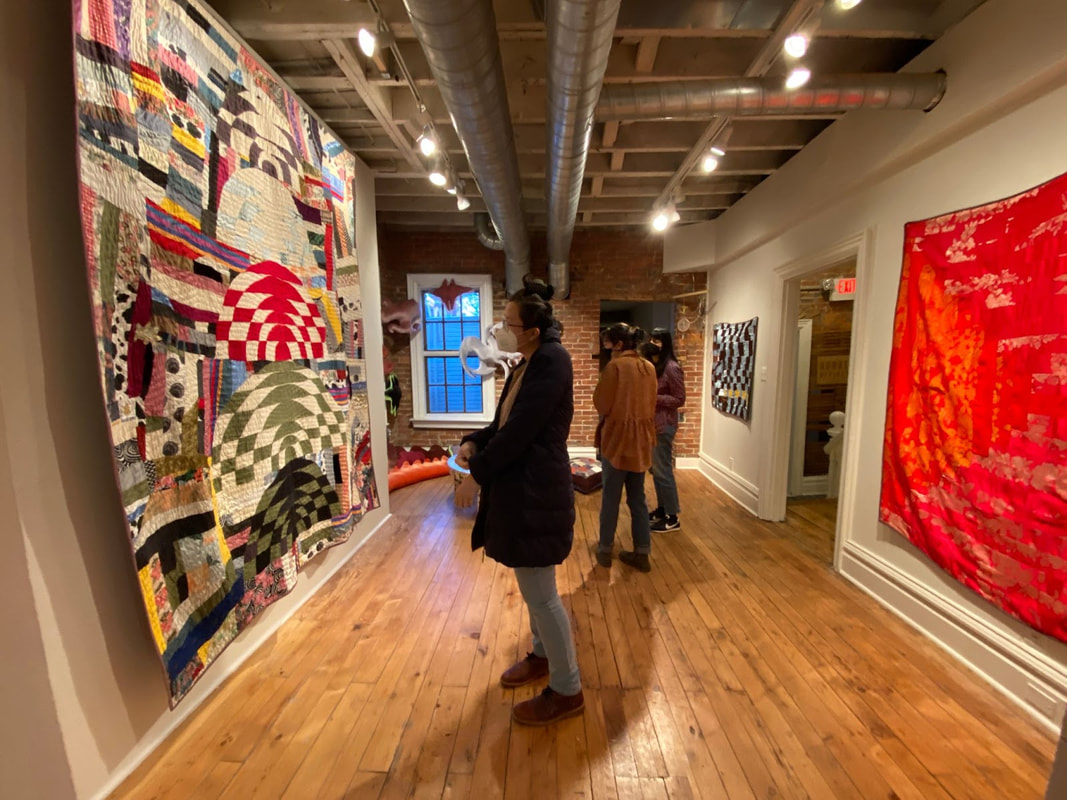
Participants walk around Bunker Projects during workshop
“Midnight Feeding (or: excerpt from my family history, fictionalized)”
Once upon a time in the southern region of an indeterminate country shaped like an S, there was a little rat with one-and-a-half little ears and a naked little tail and a tough gray coat and an even tougher stomach.
But alas, the rat lived with many other very ordinary rats that actively made the rat not want to be a rat, two chickens that actively feared the rats, a pack of dogs that actively hunted the rats, and five humans who actively ignored the rats in the skeletal shadow of a French colonial villa (why, France, why). But then again, no rent had to be paid for this high life, and one must simply put up with whichever roommate one ended up with in this robust capitalist economy with a socialist flavor.
One night, the rat went into the house looking for a snack. The humans were sleeping, one on her own mat and another four packed like oversized sardines under a shared quilt in a separate room. They were… accessible. Climbable.
The rat approached the human sleeping alone first. She smelled like dated perfume and rotten poetry books from a long past revolution. Hard pass. The rat was hungry, but it was not about to consume history.
Three of the humans were fully covered under the quilt—hairless cowards could not stand the evening chill. The last human was a long one; his two feet stuck out from under the quilt, quivering.
Food is food is food, is sometimes a foot. The rat sighed–the muscles of its hindlegs rippled as it stood up, unlocked its jaws, and sank its teeth into the nearest big toe…
The rat chipped its front tooth. The toe was heavily calloused. —Phoenix Crimson
“Softer, Familiar”
There was a clock in the Moon family study whose tick made me hear the tick in all other clocks, the air shut in by glass doors, a deep private space where I would wonder, how did I end up here?
There is a deep privacy to the quilt that comes through warm and alive, the plants tended and candle lit, but also through the ornate boxes, stacked orderly and not.
There are a number of movies I watched as a child that I remember vividly but don’t remember what they were titled or why they were playing. One of those films was a Chinese movie about a mother and daughter. The daughter was a gifted singer, and her mom kept pushing her to sing better and better. There is a final scene set in the snow that I remember best, the mother returning to the home they shared, angrily flailing at her daughter – success took her away from her mother, under the coaching of a professional instructor. Her mother felt bitter, left behind.
Her lashing is verbal and physical, but she strikes mainly these towering piles of boxes inside the room, stacked against the walls. The boxes keep falling and falling, and when the mother stops, she finds her child motionless under a pile of boxes.
The mystery and weight of the boxes on that quilt is familiar, a generational gravity. —Bonnie Fan

Participants writing on floor during workshop at Bunker Projects
“companion piece”
yesterday looking at Anne’s boxes, i thought it really could be this easy. that i’m a smooth slab of granite that falls flat on flat surfaces so i’ve made my own stand and made the stand my own, and Paul’s something else in that cubby with me, and we’re next to Brent, who is something like me but different, something more not same not different, and Elina is something funky and resourceful, and i can’t figure out who is that not-effervescent-not-laden chiming spider sensibility, and Anne’s where? but yesterday i wasn’t looking for Anne when i thought i am really happy with this box i’m in, the others i’m next to. It was so big and well lit, like a large house sitting solid on the bank of a river.
Paul is moving to a big box across town that has more than enough room for the two of us to be the two of us, and i’m going to be packed into a moving box out of the state. Anne has left and what’s left of her? yesterday Brent said about Anne, that she can see the life of things because she doesn’t think anything different, anything else, so things don’t have to adhere to narrative. so things don’t have to break out of it either.
translation, Elina says, translating another, can be thought of as an afterlife, as carrying on. Noah, carrying another, says a poem has succeeded when it has made itself companionable. when i repeat this in workshop, Brent laughs at everyone’s collective oooh. Brent listens as i talk to myself and makes me hear myself back like another among others. when i carry on too long, he cuts my chasing with the question, where does this live? after.
in my box i am not lonely, rather, i am not left alone. my box is filled with thoughts of unboxing. Okiji’s thinking of Iyer’s thought on jazz: the story dwells not just in one solo at a time, but also in a single note, and equally in an entire lifetime of improvisations. Moten/Harney’s thinking up: We’ve been thinking about stuff to do. Hanging around, talking, and drinking. Eventually things deteriorated to the point where we were writing something.
i’m at the point where my writing has deteriorated because of all the things going around. i’m catching cold trying not to catch up. i can’t be still enough to write the sentence i know comes continuously next.
in my box the unboxing happens after. Anne makes things i can touch, things i can sit on, sit like, instead of sit with. Moten told Tsang he was sick of his voice and wanted her to come up with a way for him to lose it. Elina asks, how can a poem be more like a sculpture? sitting on Anne’s things like her other things, i share instead of writing and write as if it’s sharing. For Tsang, collaboration isn’t a means of making art… Making art is an excuse to collaborate. how can a poem be anything different? in my box the box happens after. —Jenna Peng
Anne Chen‘ssolo show, 偷偷摸摸 TŌUTŌU MŌMŌ, is on view through April 16th, 2023.
The JADED Collective is Pittsburgh’s first Asian American & Pacific Island (AAPI) artist collective. Led by women and non-binary artists, JADED creates spaces for AAPI representation and empowerment. Their Spring 2023 socially engaged art initiative, KIN, supported women and queer AAPI folks through events and workshops uplifting the work of local filmmakers, writers, artists, and activists.
